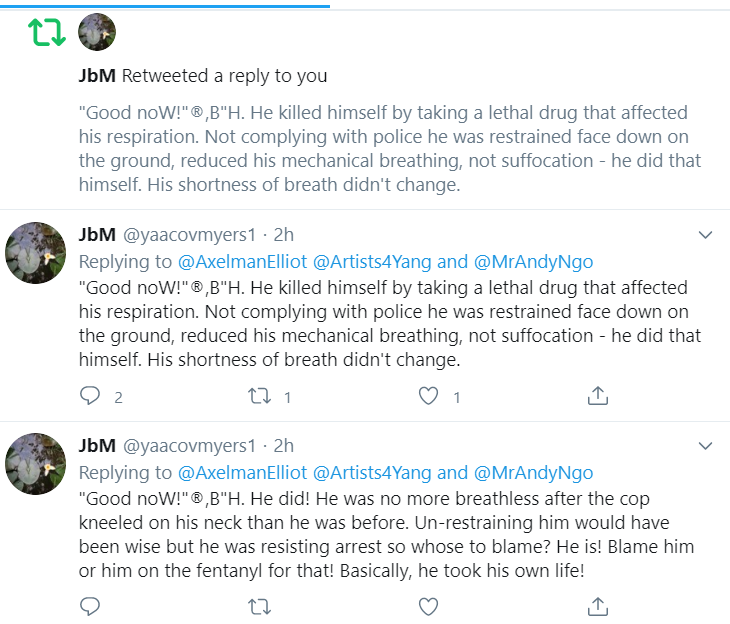“George Floyd complained of difficulty breathing just before dying”, defenders of Derek Chauvin insist. “This means that he died of a fentanyl overdose. I Googled it, and difficulty breathing is a symptom of opioid overdose! Derek Chauvin had nothing to do with Floyd’s death!”
The above statements are real defenses that I’ve heard police sympathizers repeatedly say when they discuss the recent killing of George Floyd. I could easily write an entire article on ‘confirmation bias’, but that is not exactly the focus here.
We recommend watching the video of the killing. It depicts six police officers physically restraining an unarmed man. Officer Derek Chauvin, a veteran and field training officer was the 6th cop to arrive on the scene, yet he took over the scene once he arrived. The video begins when he has the suspect pinned to the ground with his knee – on Floyd’s neck. It is true that Floyd did complain of trouble breathing while he was pinned on the ground by Chauvin and the other cops, who were holding his lower body on the ground. The audio in the video clearly demonstrates that Floyd was conscious and speaking. His breathing rate is at or above the normal rate (12 to 20 breaths per minute) until the time he dies. To those who understand emergency medicine (including this author), this makes at least one thing very clear: Floyd did not die from an opioid overdose.
Chauvin faces charges of second-degree unintentional murder, third-degree murder and second-degree manslaughter, according to the Star Tribune of Minneapolis.

As I explain in the above podcast, opioids kill people in one very specific way: They cause the person to become unconscious and eventually cause their brain to SLOW their breathing rate progressively until it reaches zero breaths per minute (apnea). Once breathing stops, the heart stops beating within a few minutes, at which point the patient is clinically dead (cardiac arrest). If Floyd would have taken a lethal amount of Fentanyl and had died as a result of an opioid overdose, he would have been unconscious and breathing slowly for a much longer amount of time leading up to his death. Anyone who verbally complains of difficulty breathing cannot possibly be suffering from opioid-related bradypnea. It is literally impossible, medically and logically.
How exactly did Floyd die?
In my professional medical opinion, Floyd died from external compression of his neck. Specifically, his right jugular vein was likely fully compressed by Chauvin’s knee, and his left jugular vein was fully or mostly compressed by the asphalt. Blocking a vein causes blood flow to stop instead of returning to the heart to be oxygenated and recirculated. In this case, nearly all of the blood in his head was prevented from draining into the body. This would have caused the backed-up blood in his head to increase the pressure within his skull, putting pressure on his brain. Once the brain matter (which is rather soft) has nowhere to go, the bottom portion of the brain is forced through the hole at the bottom of the skull. This cranial herniation causes death because the part of the brain responsible for heart and ventilatory function is crushed. Of course, pressure on the neck could cause all sorts of other issues, such as vagal nerve compression, which also could have been a factor in his death.
Floyd’s death also could have been caused partially or completely by ventilatory compromise as a result of the pressure placed on his chest. After initially dismissing the possibility of his breathing being severely restricted by the pressure on his upper body, I have since reconsidered. After consulting with another medical professional whom I have tremendous respect for, I thought back to my years of training in grappling (BJJ). When a 200 pound person placed all of his weight on my chest, I could not move any air into my chest, and I would either tap out within a few seconds or I would escape from the position. Of course, the inspiratory muscles (the diaphragm and the intercostal muscles) cannot move 200 pounds. In Floyd’s case, there could have been anywhere from 100-300 pounds of force on his chest. Additionally, he was placed in the prone position and his arms were behind his back, both of which make it even more difficult to breathe. I am now of the opinion that he could have died from ventilatory asphyxiation at the hands of the cops.
Regardless of the facts, science, and logic, die-hard supporters of police remain unconvinced. They already have decided that Floyd was a bad person who deserved to die. They have also decided that Chauvin had nothing to do with the death of Floyd. No amount of facts could change their minds. In fact, they search for sources to back up their claims, in an effort to gain public support for Chauvin’s inevitable acquittal.
One pro-police blog struck gold when they found out that one of the reports stated that Floyd had Fentanyl in his blood. Without thinking, this poor excuse for a publication heard the word ‘Fentanyl’ and ran with it, publishing this embarrassing article on August 27th. The article has no links to sources, but it does have a picture of an email reportedly sent regarding Floyd’s bloodwork that was run when he was admitted to the hospital (presumably when he arrived just after dying). These screenshots are seemingly their only source, and the impetus for their article:
Contrary to what the author claims, the report does not say that Fentayl killed Floyd, nor does it imply that Chauvin had nothing to do with his death. It says that the amount of Fentanyl in his blood could be high enough to theoretically cause pulmonary edema (fluid in the lungs). This condition would cause a person to have more trouble breathing than average people. Considering that he was walking around and talking normally just before dying, he likely had little to no pulmonary edema. As many have implied, he was likely a chronic Fentanyl user, meaning that his tolerance was probably quite high. The bloodwork report says that he had a high level of Fentanyl in his system compared to the lab’s normal baseline reference range. To chronic users, of course, that same level could be their baseline. The bloodwork also seems to mention a very low level of methamphetamine in the blood.
Keep in mind that the above email was regarding blood work done in a hospital, not an autopsy. I am giving the author of that ridiculous article the benefit of the doubt by presuming that the bloodwork mentioned was done on the day he died and not at a prior time.
Two autopsies were conducted on Floyd.
The independent autopsy found that Floyd died of “mechanical asphyxiation”.
The government (keep in mind that the government is literally the same team as Chauvin, the prosecutor, and the judge – they are all essentially coworkers) autopsy found that Floyd died of “cardiopulmonary arrest complicating law enforcement subdual, restraint and neck compression.”
The two autopsies – including the one conducted by Chauvin’s own coworkers – found that Floyd died from neck compression.
As expected, Chauvin’s lawyer is arguing that Floyd died from a fentanyl overdose, despite video evidence and both autopsies saying the exact opposite. Not only is that his argument, but he’s asking the judge to throw out the entire case, essentially finding Chauvin innocent of all charges. Do you believe that Chauvin is totally innocent?
Now that the trial has begun, we have much more evidence, nearly all of which points towards murder:
The Minneapolis police chief, who had been a cop in the city since 1989 and certainly loves and supports police officers said that Derek Chauvin did not follow protocol and showed clear disregard for human life.
A Firefighter/EMT who witnessed the killing said that it looked like murder.
A professional MMA fighter (an expert in martial arts chokes) said that it looked like murder. He tried to get the cops’ attention and was ignored and shoved by officer Tao. He called 911 to report a murder.
Testimony proved that Chauvin did not take his knee off of Floyd’s neck, although the paramedics asked him to do so and although Floyd was unresponsive (in cardiac arrest by the time paramedics arrives).
It was discovered that the officers used a ‘maximum restraint technique’ inappropriately and violated protocol by not using the MRT device and by not calling for a supervisor immediately, and by keeping Floyd prone.
The defense attorney appears to be a professional and is doing his best, but the best defense he has come up with is that maybe Floyd shoved a massive amount of fentanyl up his rectum an instant before any video started filming, and that Floyd had difficulty breathing and died of an opioid overdose and that Chauvin had nothing to do with his death. The attorney is very smart. He is just smart enough to know that a high co2 could be caused by hypoventilation secondary to opioid overdose – but he is not quite smart enough to know that anyone in cardiac arrest could have a very high co2 for many reasons, especially when taken from venous blood.



